Vegetarian Statistics By Benefits, Country and Demographics
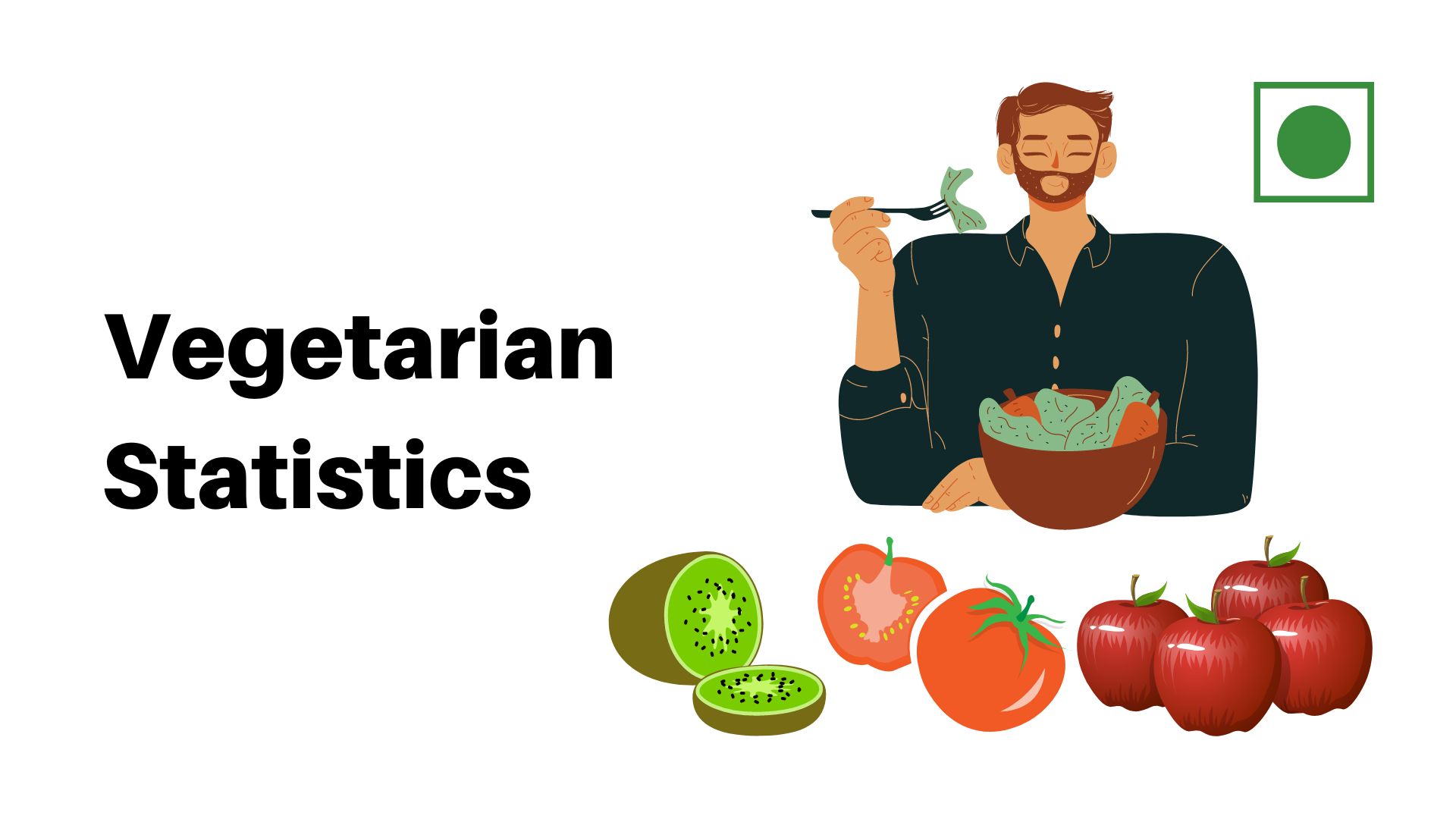
Page Contents
- Introduction
- Editor’s Choice
- What Comes Under Vegetarianism?
- Types of Vegetarians
- Benefits of A Plant-Based Diet
- General Vegetarian Statistics
- Vegetarian Statistics By Country
- Vegetarian Statistics By Demographics
- Vegetarian Statistics By Diet Type
- Vegetarian Statistics By Region
- Vegetarian Statistics By Consumer Behaviour
- Vegetarian Statistics By Reasons To Become Vegetarian
- Top Five Delicious Vegetarian Meals To Reduce Weight
- Conclusion
Introduction
Vegetarian Statistics: Day by day, vegetarian diets are increasing in popularity due to various reasons that may include economic, financial as well as environmental reasons. In some countries, where culture is most followed, people strictly become vegan or vegetarian by birth and follow it until the last. Becoming vegetarian is the most affordable way to live a healthy and happy life. This type of diet provides nutrients and vitamins every day which keep needed for the body to function properly.
These Vegetarian Statistics are written focusing on the American region, as a bonus content you may find some recipes to reduce weight at the end.
Editor’s Choice
- Millennials are more likely to eat out at restaurants because they provide diet-specific foods on their menus in the United States of America.
- Around the world, approximately 1.5 billion people prefer to avoid meat and meat-based products.
- As of 2023, there are 26,932 restaurants in the United States of America that are Vegetarian or Vegan based.
- Moreover, it is expected that the growth of similar restaurants will be at 3.3% in 2023.
- According to Vegetarian Statistics, people with plant-based diets are 32% less likely to face cardiovascular hospitalizations.
- Studies show that millennials are 30% more likely to eat non-meat-based products as compared to older generations.
- While shopping, millennials give preference to “must-have” ingredients in vegetarian food packets.
- There are around 11.2 million employees working in the restaurant industry that provide plant-based food options.
- Plant-based dairy replacement beverage market has already captured 40% of the vegetarian as well as vegan market.
- 69% of Americans completely avoid eating meat-based products, whereas, 36% of Vegetarian Diet followers are eating plant-based meats.
What Comes Under Vegetarianism?
A person who is vegetarian does not eat any meat, seafood, poultry or fish and these ingredient-based products. They tend to eat plant-based products such as seeds, grains, vegetables, fruits, and nuts. Moreover, the food consumption also includes eggs as well as dairy products. India has the highest rate of vegetarians compared to other countries. In other view, it is not viewed as a diet but it is followed since birth as a part of the culture. Vegetarians can gain nutrients and protein from various sources such as seitan, lentils, beans, tofu and tempeh. Following are some of the types of vegetarians observed around the world.
Types of Vegetarians
- Vegan – excludes fish, eggs, poultry as well as meat, and products containing mentioned ingredients.
- Lacto-Ovo Vegetarian – Includes dairy products as well as eggs, but excludes fish, meat and poultry
- Ovo-Vegetarian – Includes Eggs, but excludes seafood, dairy products, poultry, and meat
- Lacto-Vegetarian – Includes dairy products such as yoghurt, butter, milk and cheese but excludes poultry, fish, meat and eggs.
- Pescatarian – Includes fish, but excludes eggs, dairy, meat and poultry.
Benefits of A Plant-Based Diet
- Reduction in daily constipation
- Manages blood sugar level
- Reduces inflammation
- It can prevent type 2 diabetes
- Keep overall health in good condition
- Reduces bad cholesterol
- Reduces the risk of diagnosing with heart-related diseases
- It can aid in reducing carbon footprints
- Contains enough vitamins and nutrients needed for the body.
General Vegetarian Statistics
- Every year, plant-based sales account for around $1.5 billion.
- Moreover, in the United States of America, plant-based food sales have increased by 8.1%.
- Furthermore, the plant-based dairy replacement beverage market has already captured 40% of the vegetarian as well as vegan market.
- Around the world, approximately 1.5 billion people prefer to avoid meat and meat-based products.
- 80% of the agricultural land is used for dairy-based products or meat-based products.
- According to Vegetarian Statistics, people with plant-based diets are 32% less likely to face cardiovascular hospitalizations.
- As of 2022,10% of Americans have identified themselves as Vegetarian.
- As of 2023, there are 26,932 restaurants in the United States of America that are Vegetarian or Vegan based.
- Moreover, it is expected that the growth of similar restaurants will be at 3.3% in 2023.
- There are around 11.2 million employees working in the restaurant industry that provide plant-based food options.
- People with plant-based diets have 14% less risk of being diagnosed with Cancer.
- 22% of the Global population has shifted to a vegetarian diet.
- 37% of the residents of the United States of America eat vegetarian food when they dine out.
- By 2030, Vegetarian Statistics estimated that the total number of sales will reach $162 billion with an increase in plant-based foods.
- By 2025, the global plant-based food market is projected to reach $77.8 billion.
- The majority of Americans around 55% are shifted to a Vegetarian diet for health benefits as of April 2023.
Vegetarian Statistics By Country
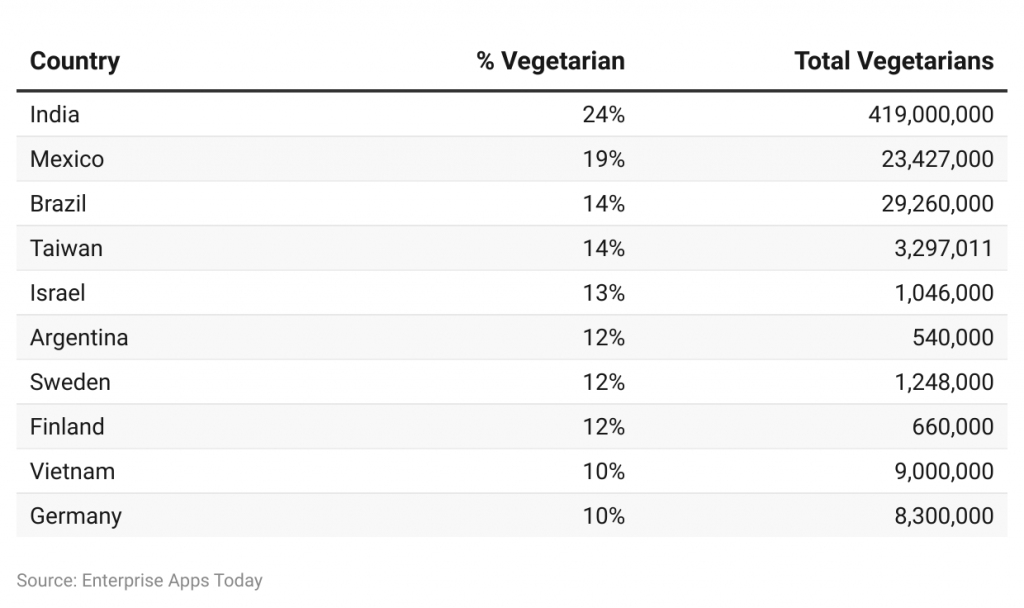
(Reference: worldpopulationreview.com)
According to the above chart, as of 2023 India, Mexico and Brazil have the highest share of vegetarians in the world.
- India – 24% (419,000,000)
- Mexico – 19% (23,427,000)
- Brazil – 14% (29,260,000)
- Taiwan – 14% (3,297,011)
- Israel – 13% (1,046,000)
- Argentina – 12% (540,000)
- Sweden – 12% (1,248,000)
- Finland – 12% (660,000)
- Vietnam – 10% (9,000,000)
- Germany – 10% (8,300,000)
Vegetarian Statistics By Demographics
- While shopping, millennials give preference to “must-have” ingredients in vegetarian food packets.
- 37% of millennials state that eating meatless food is a healthier option.
- Around the world, 22% of millennials, 13% of Gen X and 11% of baby boomers have shifted to a Vegetarian diet at some point in their lifetime.
- Studies show that millennials are 30% more likely to eat non-meat-based products as compared to older generations.
- 74% of women living in the United States of America are women.
- Millennials are more likely to eat out at restaurants because they provide diet-specific foods on their menus in the United States of America.
- 1 out of 2 black Americans strictly follows a vegetarian diet throughout their lifetime.
- A study states that following a plant-based diet can save around $1 trillion every year.
- Only 18% of the people who are vegetarians are found obese.
- A vegetarian diet is equally effective for weight loss as a conventional diet.
- Records state that consumers who follow vegetarian diets are 50% less likely to be diagnosed with type 2 diabetes.
- Furthermore, death by heart disease can be reduced by following a plant-based diet by 40%.
- 5% of the population in the United States of America is vegetarian.
By Numbers
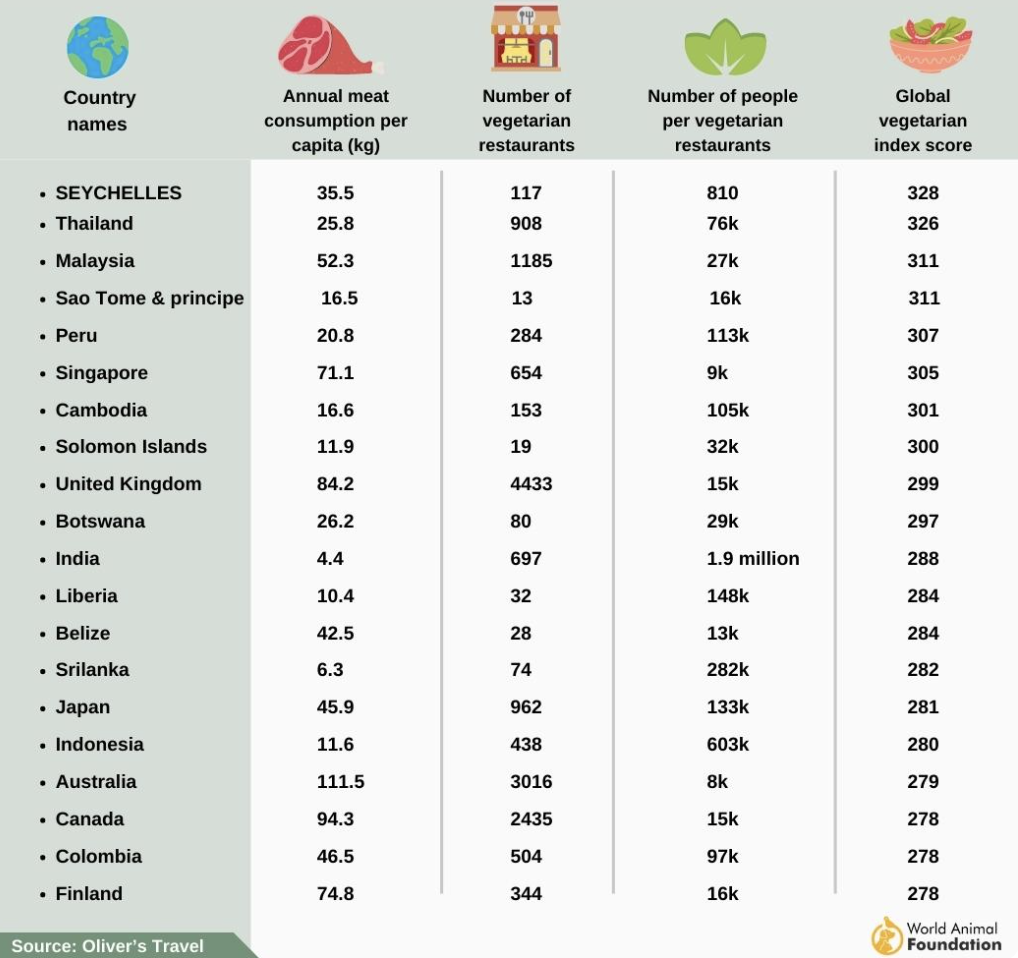
(Source: worldanimalfoundation.org)
Vegetarian Statistics By Diet Type
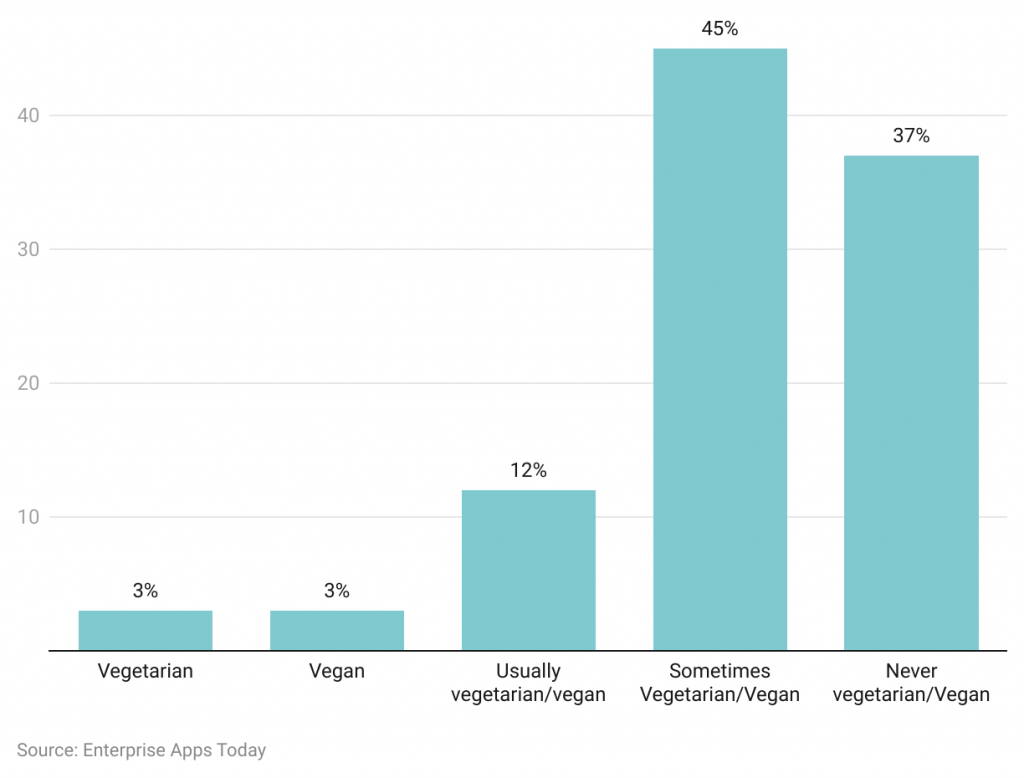
(Reference: thehill.com)
- There are only 3% of the population in the United States of America who follow a Vegetarian diet.
- Similarly, 3% of the people are vegan.
- Whereas, 12% of the people are vegetarian as well as vegan.
- And 45% and 37% of people have sometimes followed either of the diets while the remaining people have never followed both types of plant-based diets.
Vegetarian Statistics By Region
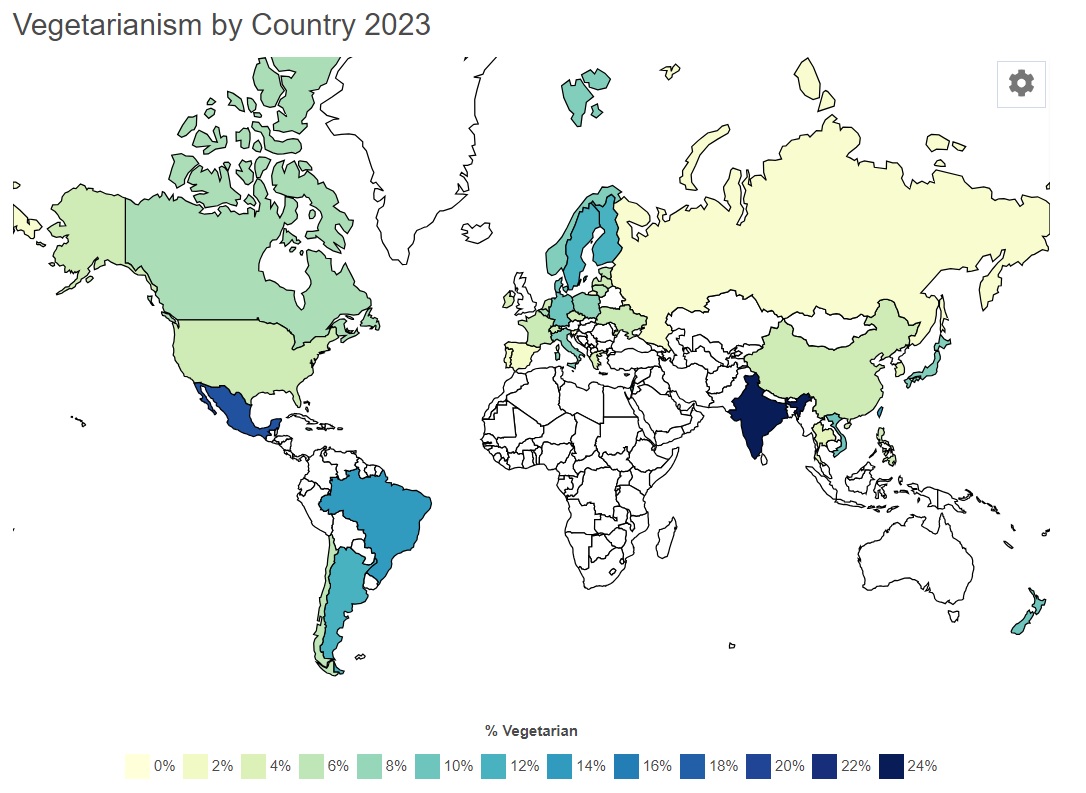
(Source: worldpopulationreview.com)
Vegetarian Statistics By Consumer Behaviour
- For the majority of the people who shift to plant-based meat substitutes, the most wanted feature is the taste of the product.
- 69% of Americans completely avoid eating meat-based products, whereas, 36% of Vegetarian Diet followers are eating plant-based meats.
By New Year’s Resolutions
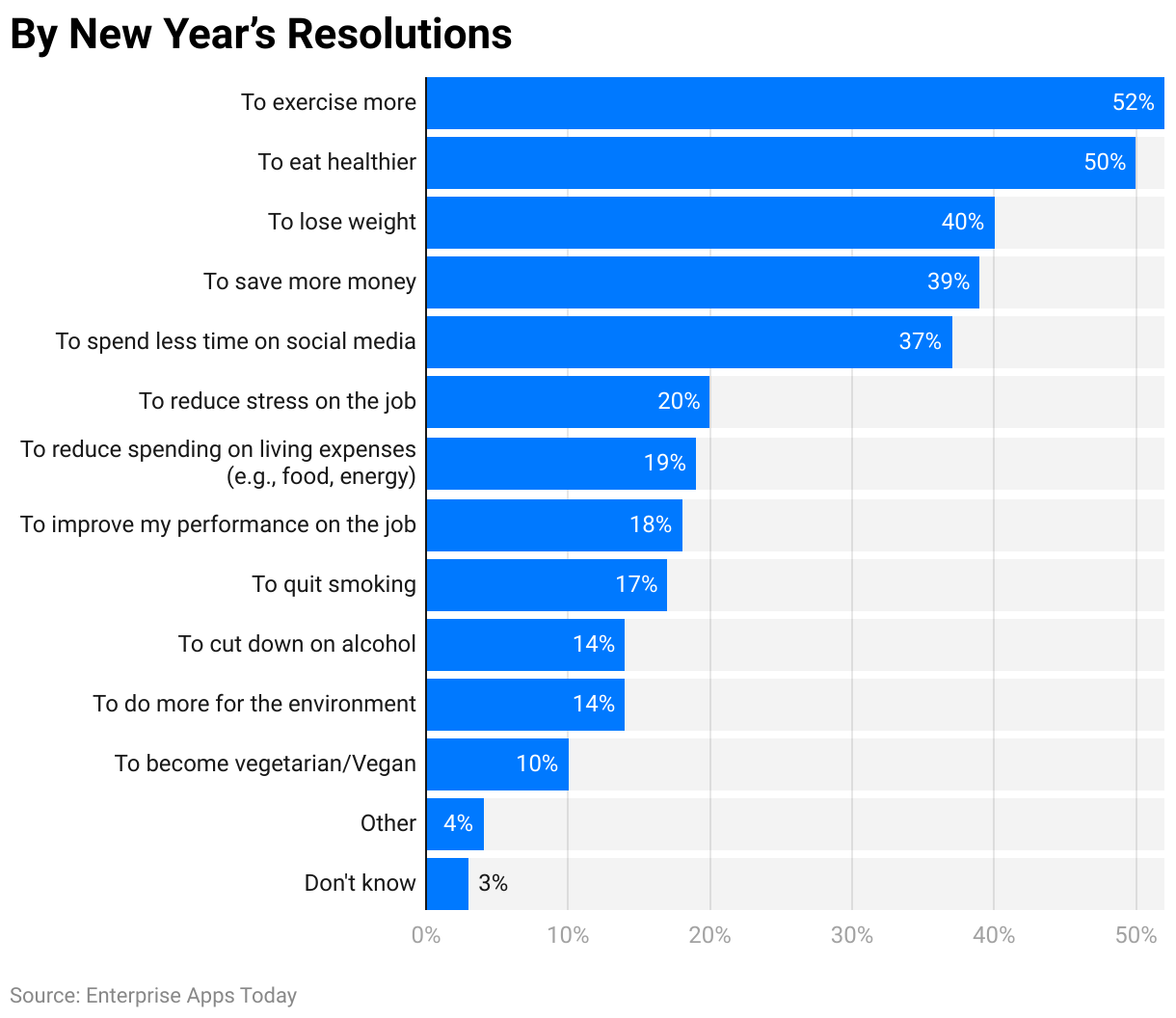
By Age Group
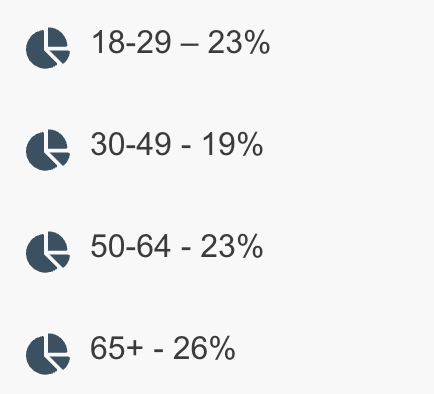
(Source: greatgreenwall.org)
- Vegetarian Statistics by demographics state that the highest number of people that changed their lifestyle to Vegetarian are 65 years and above resulting in 26%.
- Furthermore, consumers in 50 to 64 years and 18 to 29 years contribute equally by 23%.
- The lowest number of vegetarians are in the group of 30 to 49 years, resulting in 19%.
Vegetarian Statistics By Reasons To Become Vegetarian
- 69% for health reasons
- 68% for animal protection
- 63% because of negative feelings about meat and animal products
- 59% because of environmental concern
- 52% for taste preferences
- 29% for social justice
- 22% for religious or spiritual convictions
- 21% to eat less expensively
- 11% are influenced by peers
- 7% to follow food trends
(Source: livestrong.com)
- The majority of the people resulting in 69% who turned to the Vegetarian diet stated, they did it because of health reasons.
- 68% of people did it for animal protection whereas 63% of consumers experienced negative feelings about animal products as well as meat.
- Other reasons that made people shit to a Vegetarian diet are environmental concerns (59%), taste preferences (52%), social justice (29%), religious or spiritual convictions (22%), eating less expensive (21%), influenced by peers (11%) and food trends (7%).
Top Five Delicious Vegetarian Meals To Reduce Weight
Here are five vegetarian meals that can support weight reduction, including a list of ingredients and a brief description of how to make them:
#1. Quinoa Salad with Roasted Vegetables:
Ingredients:
- Cooked quinoa
- Assorted roasted vegetables (e.g., bell peppers, zucchini, eggplant, cherry tomatoes)
- Spinach or mixed greens
- Lemon juice
- Olive oil
- Salt and pepper
Instructions:
- Toss the cooked quinoa, roasted vegetables, and spinach or mixed greens together in a bowl.
- Drizzle with lemon juice and olive oil.
- Season with salt and pepper to taste.
- Mix well and serve as a nutritious and filling salad.
#2. Chickpea and Vegetable Stir-Fry:
Ingredients:
- Cooked chickpeas
- Assorted stir-fry vegetables (e.g., broccoli, carrots, bell peppers, snap peas)
- Garlic
- Ginger
- Low-sodium soy sauce or tamari
- Sesame oil
- Optional: red chilli flakes or sriracha for spice
Instructions:
- Heat sesame oil in a pan or wok and add minced garlic and ginger.
- Add the stir-fry vegetables and sauté until crisp-tender.
- Stir in the cooked chickpeas and season with soy sauce or tamari.
- Add optional chilli flakes or sriracha for added spice.
- Cook for a few more minutes, ensuring the flavours are well combined.
- Serve hot as a satisfying and protein-packed stir-fry.
#3. Lentil and Vegetable Soup:
Ingredients:
- Cooked lentils
- Assorted chopped vegetables (e.g., carrots, celery, onions, kale)
- Vegetable broth
- Garlic
- Turmeric
- Cumin
- Salt and pepper
Instructions:
- In a large pot, sauté garlic and onions until fragrant.
- Add chopped vegetables and cook until slightly tender.
- Stir in cooked lentils and season with turmeric, cumin, salt, and pepper.
- Pour in vegetable broth and simmer until the flavours meld together.
- Adjust seasoning as needed and serve as a comforting and fibre-rich soup.
#4. Spinach and Mushroom Omelette:
Ingredients:
- Eggs
- Spinach leaves
- Sliced mushrooms
- Onion (optional)
- Salt and pepper
- Olive oil
Instructions:
- In a non-stick pan, heat olive oil over medium heat.
- Add sliced mushrooms and onions (if using) and cook until tender.
- Add spinach leaves and cook until wilted.
- In a separate bowl, whisk eggs and season with salt and pepper.
- Pour the egg mixture over the vegetables in the pan.
- Cook until the omelette is set and lightly browned on both sides.
- Slide onto a plate and serve as a protein-packed and low-calorie meal option.
#5. Grilled Vegetable Wrap:
Ingredients:
- Assorted grilled vegetables (e.g., zucchini, bell peppers, eggplant)
- Hummus
- Whole wheat or spinach tortilla wrap
- Fresh greens (e.g., lettuce, baby spinach)
- Optional: feta cheese or sliced avocado
Instructions:
- Spread a layer of hummus on the tortilla wrap.
- Add the grilled vegetables on top of the hummus.
- Top with fresh greens and optional feta cheese or sliced avocado.
- Roll up the wrap tightly and slice it in half if desired.
- Secure the wrap with a toothpick if needed.
- Serve the grilled vegetable wrap as a satisfying and fibre-rich meal option.
Remember to adjust the quantities of ingredients based on your personal preferences and nutritional needs. These meals offer a balance of protein, fibre, and essential nutrients while being lower in calories, which can support weight reduction when combined with a balanced diet and regular exercise.
Conclusion
As of today, there are thousands of diet types that people are trying every year. Each of the diet types has different benefits to the body. In order to stay healthy, it is important to follow at least one type of diet in today’s world. Although every diet has some drawbacks, they are surpassed by benefits.
Sources
FAQ.
A vegetarian diet is a plant based diet that excludes consumption of seafood, poultry and meat. People who follow a vegetarian diet eat grains, nuts, fruits and vegetables, and seeds. In some cases, eggs are also included.
Protein and other required nutrients can be obtained from ingredients such as tempeh, tofu, seitan, seeds, quinoa, nuts, legumes such as chickpeas, beans and lentils, citrus fruits, pumpkin seeds, and spinach. Other nutrients or vitamins can be fulfilled by consuming natural or plant based supplements.
Anyone can follow a vegetarian diet.
Yes, it is possible to lose weight by following a vegetarian diet. Before going forward, speak to your doctor about the quantity of the food consumption so that the balance of vitamins, minerals, proteins and nutrients can be maintained in the body.

By conducting scientific research, I write about illness, health and healthcare. As a professional medical writer, my experience includes creating feature articles for newsletters and websites as well as research news stories for doctors and researchers. Reading has been an integral part of me since childhood - I'm fan of "Friends" and the "Harry Potter series". Before this career, I was employed by a French multinational company. However, my passion for reading led me to pursue writing professionally; my first Amazon-published short story entitled "The envelope that changed our lives" has recently been released. In my free moments, I enjoy long bike rides around town.